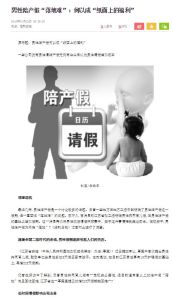Join getAbstract to access the summary!

Join getAbstract to access the summary!
Du Xiao and Cao Mingzhu
New Dads Aren't Taking Paternity Leave
Why Is This Social Benefit Still Just Words on Paper?
Phoenix Weekly, 2018
What's inside?
How do Chinese people view paternity leave and its place in Chinese society?
Recommendation
Du Xiao and Cao Mingzhu, reporters at The Legal Daily, provide a broad overview of how the Chinese perceive paternity leave and what social environment shapes their opinions. The authors assume familiarity with societal norms such as the one-month confinement period for new mothers after giving birth, the decades-long One Child Policy which ended in 2015, the existence of live-in maternity care centers as well as the current practice of providing maternity leave but not necessarily paternity leave which can contribute to gender bias in the workplace. As of October 2016, 29 out of 32 provinces or municipalities formally stipulate paternal leave, ranging from 7 to 30 days depending on the province. Most of these provinces opt for 15 days of paternity leave. Although published by The Legal Daily, the article dedicates more space to covering the opinions of interviewees (all of whom are residents of Beijing) than to outlining the finer details of legislation related to this topic. getAbstract recommends the article to those interested in gender roles in China.
Summary
About the Authors
Du Xiao is a reporter at The Legal Daily where Cao Mingzhu is an intern.

















Comment on this summary